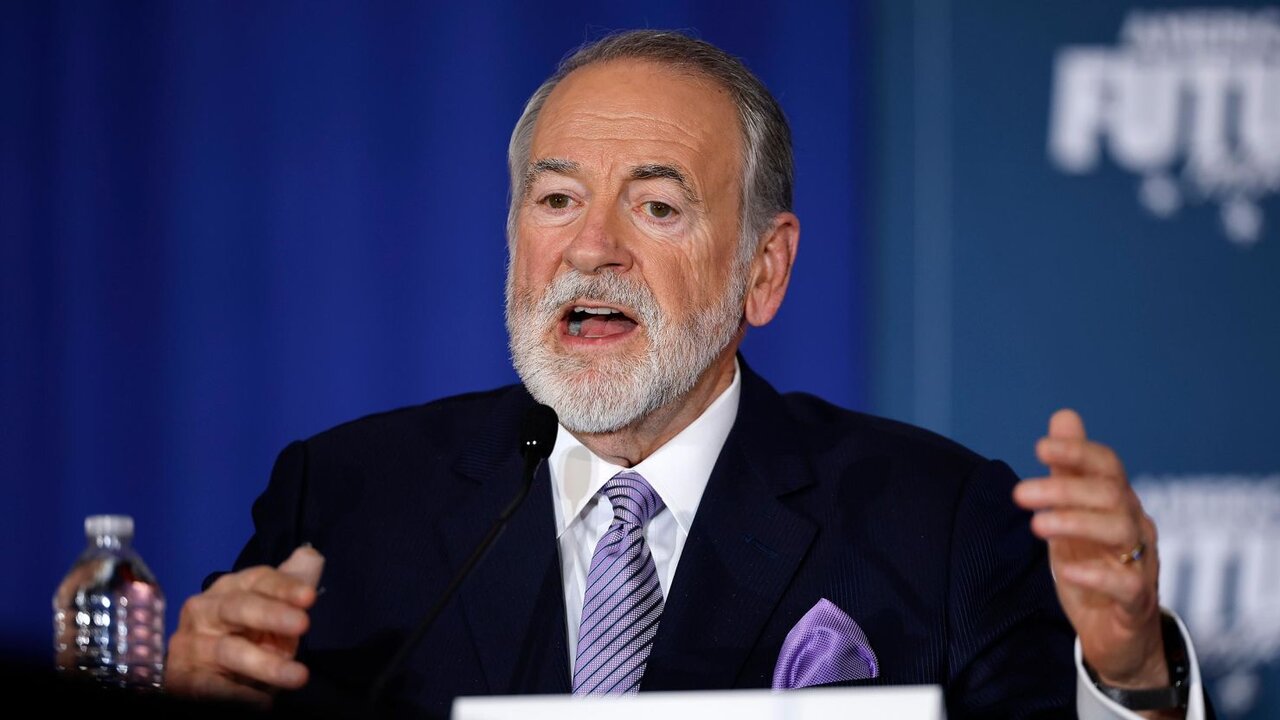Picking Mike Huckabee for ambassador to Israel spells more misery for Palestinians
Former Arkansas Gov. Mike Huckabee, our incoming ambassador to Israel, has never been shy about his opinions on the Middle East: Palestinian land belongs to Israel alone, and Palestinians themselves do not exist as a people. As ugly as that rhetoric is, though, is it really worse than the blood-soaked reality on the ground today in Gaza,


Former Arkansas Gov. Mike Huckabee, our incoming ambassador to Israel, has never been shy about his opinions on the Middle East: Palestinian land belongs to Israel alone, and Palestinians themselves do not exist as a people.
As ugly as that rhetoric is, though, is it really worse than the blood-soaked reality on the ground today in Gaza, Lebanon and the West Bank — a situation the Biden administration has helped create with billions of dollars worth of weapons? In my opinion, no.
Donald Trump’s appointment of Huckabee and other hardliners shows just how little the president-elect cares about what happens to Palestinians — no surprise there. The idea that a vote for Trump might serve to end the war was always terribly misguided.
But personally, I can’t blame Arab-Americans in Michigan or any other voters who withheld support for Kamala Harris over the killing in Gaza. Because the fact is that there’s less daylight than Democrats would care to admit between the explicitly stated position of zealots like Mike Huckabee and the tacit position of the U.S. under Biden, Trump, Obama and all the presidents before them who have not only excused Israel’s abuses toward Palestinians but supplied the Israeli with an endless stream of military aid.
Here’s Huckabee on the 2008 presidential campaign trail, responding to two Orthodox Jewish men who asked the former governor his thoughts on establishing a Palestinian state somewhere outside of Israel and the occupied territories. (That’s the land in the West Bank and Gaza Strip that by rights belong to Palestine, but which Israel has occupied ever since the 1967 war between Israel and neighboring Arab states.) Video of the exchange was published by BuzzFeed News in 2015, when Huckabee was seeking the 2016 GOP nomination.
“Basically, there really is no such thing as — I need to be careful about saying this, because people will really get upset — there’s really no such thing as a Palestinian,” Huckabee says. “There’s not.”
The men he’s speaking to nod and smile. “Finally, someone said it!” a person says off camera.
Huckabee continues: “You have Arabs and Persians, and there’s such complexity in that. But there’s really no such thing. That’s been a political tool to try and force land away from Israel.”
Do the millions of Palestinians in the West Bank and Gaza exist simply as a “political tool” to be used against Israel? Radical as that may sound, it’s not exactly a new sentiment, or even a marginal one in Israeli politics. The most infamous instance of the line came from Israeli prime minister Golda Meir — whom President Joe Biden has often bragged about meeting as a young senator — in a 1969 interview with a British newspaper:
There was no such thing as Palestinians. When was there an independent Palestinian people with a Palestinian state? It was either southern Syria before the First World War and then it was a Palestine including Jordan. It was not as though there was a Palestinian people in Palestine considering itself as a Palestinian people and we came and threw them out and took their country from them. They did not exist.
What Meir meant then, and what Huckabee and similar hardliners mean today, is presumably that “Palestinians” are a subset of Arabs who did not have their own national identity before Israel’s declaration of independence gave it shape. How the Palestinians themselves see the situation doesn’t matter to pro-Israel hardliners, of course.
The goal of such rhetoric is to disguise the undeniable fact that Israel — like the United States! — was built on the forced expulsion of hundreds of thousands of human beings from their homes.
The goal of such rhetoric is to disguise the undeniable fact that Israel — like the United States! — was built on the forced expulsion of hundreds of thousands of human beings from their homes. It’s also meant to excuse Israel’s ongoing occupation of the West Bank, a roughly 2,000-square-mile area on the western side of the Jordan River that would make up the bulk of any theoretical future Palestinian state. The West Bank has been steadily sliced and diced into pieces over the past 50 years by Israeli settlements and connecting roads and other infrastructure.
Huckabee, an evangelical Baptist minister, insists the West Bank doesn’t exist either. He refers to the area by its Biblical name, which is also preferred by the Israeli settlers who continue to seize Palestinian land and declare it their own.
“There are certain words I refuse to use,” Huckabee said in a 2017 interview with CNN. “There is no such thing as a ‘West Bank’ — it’s Judea and Samaria. There is no such thing as settlements — they’re communities, they’re neighborhoods, they’re cities. There is no such thing as an occupation.”
As has been the case for centuries, the West Bank is filled with far more Arab communities, neighborhoods and cities than Jewish ones. But it goes without saying that those are of no concern to Huckabee, who believes that God gave the land to the Jewish people, and that the Palestinians are effectively interlopers.
“I think Israel has title deed to Judea and Samaria,” he said in the 2017 CNN interview.
Here again, though, Huckabee’s comments aren’t as far outside the mainstream as they might sound. Consider the lecture another former Arkansas governor, Bill Clinton, delivered to Michigan voters at a rally for Harris in late October.
Voters concerned about the more than 43,000 Palestinians killed in Gaza by the Israeli military should instead keep their minds instead on the massacre of 1,200 Israelis by Hamas on Oct. 7, 2023, Clinton told them.
“I got news for [Hamas] — they were there first,” the former president said, referring to the Jews. “Before their faith existed.” (“They” here presumably means Hamas, or Muslims in general.) The Jews “were there in the time of King David and the southernmost tribes at Judea and Samaria,” Clinton said. Clinton did, at least, called for an end to the killing — in vague terms — and urged “a new beginning” to the peace process that began when he was president in the ’90s.
There’s a big difference between that rhetoric and what’s been said by people like Huckabee or Sen. Marco Rubio, Trump’s pick for secretary of state. But how much of the distinction is just that — rhetorical? Even as Biden and Secretary of State Antony Blinken have publicly admonished Netanyahu, they’ve sent $18 billion in military aid to Israel since last October. Most tellingly, the Biden administration backed down from its own 30-day deadline for Israel to allow more humanitarian aid to flow to famine-stricken northern Gaza, despite the fact the election is over and the president is a lame duck. It’s no surprise Palestinian rights groups have called such fake ultimatums “a charade.”
Then there’s the question of a long-term resolution to the conflict, in which rhetoric departs from reality completely. The U.S. still officially prescribes the “two-state solution” outlined during peace negotiations during the Clinton years, in which Israel would coexist alongside an independent Palestinian state made of the West Bank, Gaza and East Jerusalem. That idea seems more implausible than ever in the wake of last October’s massacre by Hamas — but it was likely dead long before that, considering how thoroughly Israeli settlements have encroached into and carved up the West Bank.
“There is no such thing as a ‘West Bank’ — it’s Judea and Samaria. There is no such thing as settlements — they’re communities, they’re neighborhoods, they’re cities. There is no such thing as an occupation,” Huckabee said in 2017. Huckabee, like many in the current Israeli government, has never embraced such a path. “There’s no such thing as a realistic hope of this two-state solution,” Huckabee told Politico in 2011. Rather than trying to stop Israel from building more settlements on Palestinian land, he said, the U.S. should “encourage the Israelis to build as much as they can and as rapidly as they can.”
So what’s the new ambassador’s vision for resolving the conflict long-term? Huckabee’s comments in the 2008 video taken during his presidential campaign point to an answer: Mass ethnic cleansing. Here’s what he said in response to the question from his Orthodox interlocutors about establishing a Palestinian state:
My point is, if that’s the issue, if it’s real estate, if you look at a map, and say here is how much Israel has and here is how much the Arab states hold, there is plenty of land for them to have — you know, let them take it out of Egypt. Let’s take it out of Syria. Let ’em take it out of Jordan.
That’s why news of Huckabee’s appointment was greeted with joy by Israeli settlers in “Judea and Samaria” and their political allies. One far-right minister in the Netanyahu government, Bezalel Smotrich, has already called for Israel to formally annex West Bank settlements in the wake of Trump’s election.
If you’re tempted to dismiss Huckabee as a yokel, don’t. The man really does have a long-lasting relationship with Israel: He’s traveled there countless times over the years and has built friendships with the hard-right religious conservatives who now dominate the Israeli government. He even has a decades-long side gig taking American evangelicals on pricey tours of the Holy Land, with the next “Israel Experience with Governor Mike Huckabee” scheduled for February (base fee $5,850, alcoholic beverages not included).
Perhaps the most striking thing about Huckabee’s selection, though, is the fact he’s a Baptist minister. Many evangelical Christians believe the establishment of Israel was the fulfillment of Biblical prophecy and will precipitate the second coming of Christ. In the 2011 interview with Politico, Huckabee was asked his views on the question. His reply:
Huckabee wouldn’t directly describe his view on that belief but dismissed it as irrelevant.
“Even if there was nothing about eschatology involved, the reason this, as an American, matters to me is because freedom and liberty matter to me,” he said.
It’s a non-answer, though does it really matter? The fact is, you don’t really need End Times theology to explain the love affair so many American conservatives have with Israel, a state built on ethno-nationalistic identity, military might and, increasingly, religious belief. The stranger thing, maybe, is that so many mainstream Democrats continue to back unconditional support of Israel — or at least are content to look the other way — no matter what atrocities Israel commits.
Some Democrats are surely feeling a bit of schadenfreude over Trump’s appointment of hardcore Zionists like Huckabee, given the much-discussed defection of Arab-American voters in Michigan (and perhaps young people nationwide) enraged by the slaughter in Gaza. I do not. I voted for Kamala Harris, and if I had talked to any Arab-American swing state voter about Gaza before the election, I would have urged them to do the same. But I can’t blame them for refusing to cast their ballot for the second-in-command in an administration that’s presided over the past year of carnage.
(Source: Arkansas Times)
